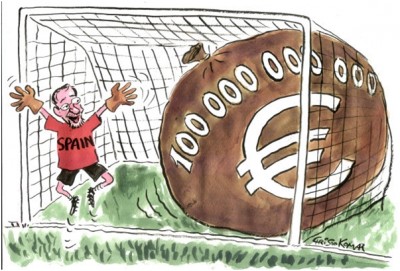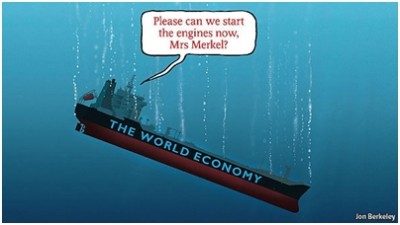Golden goal in Spanish net. Spain (unfortunately) is not Uganda! What level of interest rate Italian debt has to reach so Europe would decide to help them? Penalties and expropriations for layoffs –labour market reform done in a French way. In which countries economic laws don’t apply? And who will pay for that? Even 11 Marhsall plans didn’t help. Courage in a Slovak way.
First Things First. Congratulations to the Queen Elizabeth II on her Diamond Jubilee!
Something impossible, out of question and inadmissible (but since the beginning of the crisis that’s pretty obvious) just happened in the Eurozone. Once again politicians lied, Spain finally asked for help last Saturday and after 2,5h conference call 17 Ministers of Finance promised them aid. It is supposed to cover up to EUR 100 billion, more accurate sum will be determined by currently ongoing independent audit of the Spanish banking system. Together for Ireland, Greece, Portugal and now Spain EU has already promised aid of EUR 500 billion (EUR 1 514 per each eurozone’s citizen). This loan will go directly to Spanish fund for restructuring banks (FROB) and supposedly there won’t be any specific conditions on measures to consolidate public finances. There will be Troika in Spain though. It’s not clear yet if the loan will be granted from EFSF or permanent bailout ESM (which doesn’t exist yet, as not all the member states have ratified it). The loan in question is for 15 years with interest rate at 3% and payments postponed for 5 years. If the money comes from EFSF, Finland will require a collateral. Dutch Minister of Finance said that the aid will have to be approved by Dutch parliament.
With the loan other members of the eurozone are protecting their banks, to which Spain poses a threat. The problem is that also the Spanish public debt will increase by the amount of the provided aid. With a bit of delay, also bond markets realized this. Together with the concerns that the loan from ESM will turn existing bonds into subordinated debt, it led to increase of Spanish debt’s market interest rate. EUR 100 billion constitutes 10% of Spanish GDP, while last year the country had deficit of public finances at the level of 9% of GDP. Yields on 10-years Spanish bonds just a couple of days after “aid” overcame the maximum since the introduction of euro. It reached respectable 7% after the rating agency Moody’s lowered Spain’s rating. French President Francois Hollande has a solution. He wants he EU to decide at the closest summit on June 28 that the money from ESM can go directly to banks (and above all, to the French ones).
It is said that Spain was a bit pushed to ask for aid by Germany, France, the European Commission, ECB and the International Monetary Fund. Before weekend’s elections in Greece and France they didn’t want to leave anything to chance. There are enough problems already. President Obama, who is facing upcoming elections at home, is also in favour of immediate actions. Spanish Prime Minister Mariano Rajoy reportedly answered in SMS to his Minister of Finance, who was negotiating aid: “Resist, we are the fourth strongest country in the eurozone. Spain is not Uganda.” That’s true, Uganda has better rating.
European Commission, ECB and the International Monetary Fund. Before weekend’s elections in Greece and France they didn’t want to leave anything to chance. There are enough problems already. President Obama, who is facing upcoming elections at home, is also in favour of immediate actions. Spanish Prime Minister Mariano Rajoy reportedly answered in SMS to his Minister of Finance, who was negotiating aid: “Resist, we are the fourth strongest country in the eurozone. Spain is not Uganda.” That’s true, Uganda has better rating.
When Europe managed to hide the Spanish problem under the carpet (which is not easy, as there’s a lot of things already hidden there), a logic question “Who’s next?” came up. Cyprus is already searching for money here (EU) and there (Russia) Slovenian bank sector is not in a good shape either. But these are small fish. All the eyes are on Italy. But it doesn’t mean that as a European politician you can say it aloud. This mistake was made by jovial Austrian Minister of Finance Maria Fekter: “Italy has to work its way out of its economic dilemma of very high deficits and debt, but of course it may be that, given the high rates Italy pays to refinance on markets, they too will need support.” Mario Monti, Italian Prime Minister protested against this and called suggestions mentioning the possibility of Italy asking for aid “completely inappropriate”.
Meanwhile in the country of socialist miracles, the “reforms” continue. This time it is about the labour market. Also in France they have a problem with disappearing jobs. Minister of Labour Michel Sapin wants to present new legislation after summer. His solution is very original indeed. “Main idea is to make layoffs so expensive for the companies that it wouldn’t be worth for them”! High compensation for employees will help. Hm, how many people would Sapin hire in his fast food if he knew he would pay them for example a billion EUR while letting them go? Efforts to preserve jobs are supported also by the Minister of Economy Arnaud Montebourg. He plans to present a law, according to which companies who are firing people will have to sell their factories. Socialists just won in the second round of parliamentary elections and gained absolute majority.
Germans, who surely can’t be described as neoliberal fundamentalists, are already beginning to suspect that they will have to pay dearly for the socialist dreams in other member states (and we will have to pay with them). Recent editorial of the magazine Der Spiegel explains it surprisingly clearly: “Blessed France, where the ruthless laws of the economy lose their ability to frighten people bathing in the eternal sunlight of socialism. Indeed, despite all his calls for European solidarity, most of Hollande’s proposals are ones that others will have to pay for. Someone is obviously going to have to be responsible for all the social programs the French government is concocting. And why not the nation whose people are viewed as particularly hardworking and dependable by an overwhelming majority of the people surveyed in a recent poll?” (no, nor Greeks neither Slovaks). They would be angry that Hollande lowered retirement age of the French to 60 years, while Germans will work until 67? Tragedy of the commons is escalating..
 Honestly, it’s tough for Germany. Mainstream view was illustrated by a recent picture in The Economist. Many people in Europe and in the US complain that Germans (and Slovaks) shouldn’t be that strict and debt of the periphery should be retracted without unnecessary grumbling. After all, after World War II also Germany received aid from the US, similar to Marshall plan. This assistance was supposed to prevent spread of communism in Europe. Well-known critic of the current way of fighting against the eurocrisis, professor of the economy Han Werner Sinn, predicted it and writes to American President: “Greece has received or been promised $575 billion through assistance efforts, including Target credit, E.C.B. bond purchases and a haircut after a debt moratorium. Compare this with the Marshall Plan, for which Germany is very grateful. It received 0.5 percent of its G.D.P. for four years, or 2 percent in total. Applied to the Greek G.D.P., this would be about $5 billion today. In other words, Greece has received a staggering 115 Marshall plans, 29 from Germany alone, and yet the situation has not improved. Why, Mr. Obama, is that not enough?” Irish economist Kark Whelan thinks that Sinn should apologize to Americans for this article, as they sacrificed much more Europe much more during the World War II (lives and high debt) than just Marshall plan. Angela Merkel before upcoming G20 summit warns that even “German strength is not infinite”. Contrary to that, there are more and more signals from Germany that it might finally say yes to debt union.
Honestly, it’s tough for Germany. Mainstream view was illustrated by a recent picture in The Economist. Many people in Europe and in the US complain that Germans (and Slovaks) shouldn’t be that strict and debt of the periphery should be retracted without unnecessary grumbling. After all, after World War II also Germany received aid from the US, similar to Marshall plan. This assistance was supposed to prevent spread of communism in Europe. Well-known critic of the current way of fighting against the eurocrisis, professor of the economy Han Werner Sinn, predicted it and writes to American President: “Greece has received or been promised $575 billion through assistance efforts, including Target credit, E.C.B. bond purchases and a haircut after a debt moratorium. Compare this with the Marshall Plan, for which Germany is very grateful. It received 0.5 percent of its G.D.P. for four years, or 2 percent in total. Applied to the Greek G.D.P., this would be about $5 billion today. In other words, Greece has received a staggering 115 Marshall plans, 29 from Germany alone, and yet the situation has not improved. Why, Mr. Obama, is that not enough?” Irish economist Kark Whelan thinks that Sinn should apologize to Americans for this article, as they sacrificed much more Europe much more during the World War II (lives and high debt) than just Marshall plan. Angela Merkel before upcoming G20 summit warns that even “German strength is not infinite”. Contrary to that, there are more and more signals from Germany that it might finally say yes to debt union.
Slovakia is about to ratify the permanent form of bailout: ESM. It decided to do radical, unilateral move: we won’t wait with ratification for Germany! “We don’t want to wait somewhere in the corner if somebody will do or won’t do something. We are an independent and sovereign country and as far as it is possible to gather enough political parties to guarantee ratification of ESM, we welcome it,” said Prime Minister. Slovakia will then join the countries, which have already ratified ESM. It is as brave as being the first in the corner, where angry teacher send kids. What would it cost to say no sometimes? Soon nobody will have to ask us anything. Germany is supposed to ratify ESM together with the fiscal compact in the parliament on June 29. Next Tuesday German Constitutional Court will decide on ESM.
radical, unilateral move: we won’t wait with ratification for Germany! “We don’t want to wait somewhere in the corner if somebody will do or won’t do something. We are an independent and sovereign country and as far as it is possible to gather enough political parties to guarantee ratification of ESM, we welcome it,” said Prime Minister. Slovakia will then join the countries, which have already ratified ESM. It is as brave as being the first in the corner, where angry teacher send kids. What would it cost to say no sometimes? Soon nobody will have to ask us anything. Germany is supposed to ratify ESM together with the fiscal compact in the parliament on June 29. Next Tuesday German Constitutional Court will decide on ESM.
Union is considering in case of Grexit limiting free transfer of capital and people and imposing limits on maximal withdrawal of money from ATM. How was it with these freedoms, for which we transferred our sovereignty to Brussels? If these measures are introduced, what exactly are we saving in the eurozone?
Meanwhile Greeks are withdrawing money from banks at the pace of EUR 600-900 million daily. In German parliament there can be soon discussions about the third aid package for Greece, as long as new government is willing to implement further reforms.
Sources from G20 summit informed that in case of destabilization of the financial system after Greek elections main world central banks are ready to intervene. Shocking. As since the beginning of the crisis in the year 2007 they don’t do anything. Helikopter Ben“ hits the PRINT button in haste even when somebody slams door in FED loudly. More surprising is the fact that after the disastrous Facebook IPO Bernanke didn’t flood world with dollars.
Investor and financial commentator Jim Jubak noticed that eurocisis has negative impact on faith in paper money: “Suddenly analysts are digging into the details of how the euro system works. Quite frankly, you no more want to know how a modern paper currency is made than you want to know what goes into a cheap hot dog. And if the euro can dissolve, if the eurozone can go back to Deutschmarks and drachmas, then why should we have faith in any paper currency? The breakup of the euro won’t mean the breakup of the dollar or the yen or the real, but it sure would accelerate the search for a more secure depository of value than paper money. Even one that proclaims “In God we trust.””
May the force be with you during the weekend
Juraj Karpiš





